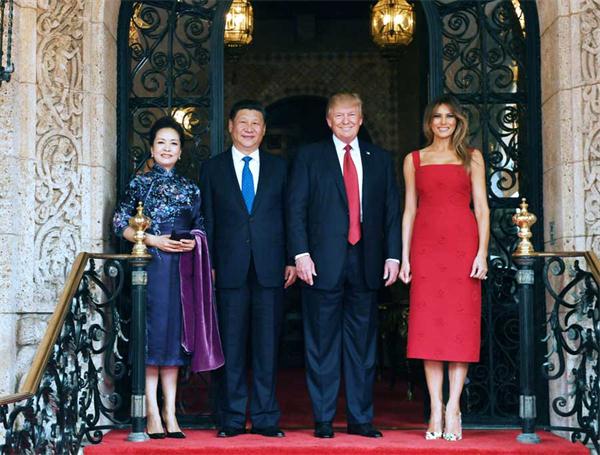A new chapter unfolds for Sino-US relations
 |
|
US President Donald Trump and First Lady Melania Trump welcome President Xi Jinping and First Lady Peng Liyuan at Mar-a-Lago estate in Palm Beach, Florida, US, April 6, 2017. [Photo/Xinhua] |
President Xi Jinping and President Trump have made a clear roadmap for the future development of bilateral relations and how to tackle major challenges facing the world during their first formal meetings last week at Mar-a-Lago in Florida.
The meetings of two leaders open a new chapter in bilateral relations, especially with more uncertainties facing the current globalization.
The face-to-face meeting was called "a summit of the new century", as China and the US have actually formed the world's most important communities of interest, and thus the destiny of the two countries is closely intertwined.
The philosophical talks and face-to-face, in-depth exchanges between the two presidents at Mar-a-Lago again helped set the right tone for future bilateral relations.
To summarize the Mar-a-Lago Summit, the following points are valuable to follow:
1.The strategic consensus of "peaceful coexistence, peaceful competition, and win-win cooperation" reconfirmed by China and the US set the guidelines and lay a solid foundation for their healthy and stable relations in the coming 4 or 8 years. As President Xi Jinping has expressed time and time again, the Pacific Ocean is big enough for both China and the US to seek their development.
Reconfirmation of each other's strategic orientation is undoubtedly crucial to keep bilateral relations on an even keel and to expand cooperation on global governance, which will exert a positive impact on the emerging international order to be shaped in the first half of the new century.
As Trump's administration posed "uncertainty and unpredictability" in its foreign policy arena, it is indeed a good thing to break this "curse" by injecting more predictability and certainty into Sino-American relations.
This successful meeting has cast light over Sino-American relations with a large dose of "predictability and certainty". Now the two parties have established a comprehensive dialogue mechanism to maintain stable relations and enhance future cooperation.
2. Consensus reached between China and the US on new trade and investment cooperation will not only mitigate the trade frictions or wars but also benefit the two giant economies and the world.
In 2016, China-US bilateral trade in goods reached $519.6 billion, service trade was over $110 billion, and two-way accumulated investment over $170 billion. Twenty-six percent of exported Boeing airplanes, 56 percent of exported soybeans, 16 percent of exported automobiles, and 15 percent of integrated circuits went to China. So, China and the US have formed highly integrated economic patterns.
The exchanges between the two peoples have been increasingly updated year by year. An average of 14,000 people travel between China and the US every day: every 17 minutes there is a flight taking off or landing among the two countries. Over 300,000 Chinese students are studying in the US, accounting for over one-third of all foreign students in the States.
3, "America First" does not equal "China Last".
"America First" is actually not in conflict with China-US economic and trade cooperation. Objectively speaking, the effective path for "America First" is likely to be achieved through "Beijing".
Similarly, the great rejuvenation of the Chinese nation is also inseparable from a friendly and favorable international environment wherein the US is a key player.
The US should be determined to adopt a win-win cooperation approach with China and get rid of the influence of extreme geopolitics. For whatever reason, trade conflicts or trade wars will only cause losses to both sides, and would crown no winner.
4, With regard to the security in Asia-Pacific, especially in East Asia, consensus and cooperation between the US and China is of great importance, which is obviously in agreement with the common interests of both countries.
If the US continues its so-called "offshore balancing" strategy agitated by neo-conservatism and increases military deterrence on China, the security interests of the two nations will be damaged.
Currently, the US and China should particularly insist on negotiation and cooperation in solving the Korean Peninsula nuclear issue and work together to solve the crisis in a peaceful manner.
Some down-to-earth suggestions proposed by China, such as the "parallel suspension proposal" should be given high attention by interested parties.
China sets itself against nuclearization and any war on the Korean Peninsula, and we believe that this is also in line with the US and other nations' interests in the region.
As an extraterritorial state that has vital interests in East Asia, the US should recognize the trend of this era while re-evaluating its Asia-Pacific strategy and China policy.
The blueprint has been drawn and the path determined. There are many opportunities and huge potential for Sino-American cooperation, which will finally fulfill the consensus of two presidents and move China-US relations onto a new level.
The author is co-chairman of the Center for China and Globalization and former vice minister of the Ministry of Foreign Affairs.
















